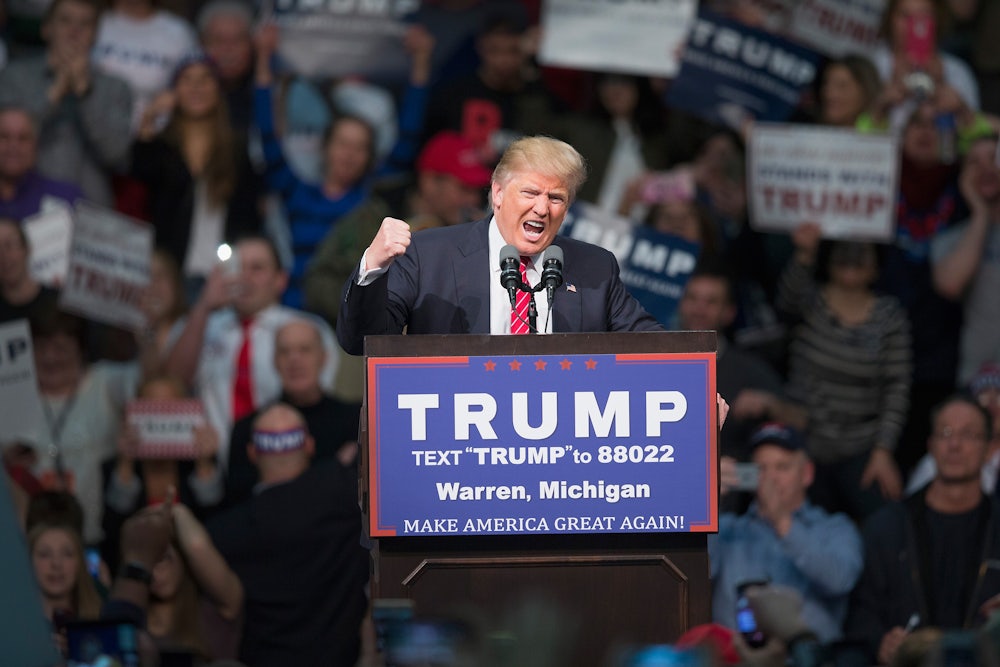Everyone remembers when Marco Rubio said Donald Trump had “small hands.” It was late February 2016, a desperate time in the year’s Republican presidential primary. Trump was on a roll, having won nearly everywhere—after narrowly losing to Ted Cruz in Iowa, he rampaged through New Hampshire, South Carolina, Nevada, and several other early primary states. And so Rubio got in the mud and tried to give voters what it seemed like they wanted: “And you know what they say about guys with small hands,” he told a stunned crowd in Virginia, letting the implication—that Trump was not well endowed—linger. It was a low moment in a primary full of them. It also didn’t work. Instead, it only served as a reminder that voters responded to schoolyard insults when they came from Trump but were less enthralled when career politicians like Rubio tried their hand at insult comedy.
What is remembered somewhat less well is that, four days earlier, Rubio had attempted a more substantive approach to taking down Trump. “I don’t know anything about bankrupting four companies. You bankrupted four companies,” Rubio said at a debate on February 25. “I don’t know anything about starting a university that was a fake university. A fake university. There are people that borrowed $36,000 to go to Trump University and they’re suing him now. $36,000 to go to a university that’s a fake school. And you know what they got? They got to take a picture with a cardboard cutout of Donald Trump.” A day later, at a rally in Dallas, he sang the same tune: “He is a con artist,” the Florida senator said. “He runs on this idea he is fighting for the little guy, but he has spent his entire career sticking it to the little guy—his entire career.” Two weeks later, Rubio was out of the race.
For nearly seven years now there has been an idea in American politics that if only voters—Republican voters, in particular—saw the “real” Donald Trump, they would recoil. On Wednesday, The Atlantic’s Mark Leibovich published a story in which several top Republican strategists made the case that it was once again time to show GOP voters the real Donald Trump. Their latest theory goes like this: If you call Trump a loser, the spell will finally break.
“I caught up recently with several Trump-opposing Republican strategists and former associates of the president who argued this restraint should end,” Leibovich writes. “The best way for a Republican to depose Trump in 2024, they said, will be to call Trump a loser, as early and as brutally as possible—and keep pointing out the absurdity of treating a one-term, twice-impeached, 75-year-old former president like a kingmaker and heir apparent. In other words, don’t worry about hurting Special Boy’s feelings.”
It’s an intriguing bit of advice, but there’s little reason to believe it will do the trick when primary season kicks off sometime next year. Especially considering the fact that there are currently zero Republicans vying for the nomination against Trump—unless you count Mike Pence, who won’t win and would be hard-pressed to convincingly mount this “Trump is a loser” attack considering his affiliation with Trump is the only thing that’s given him some vestige of a “political career.”
Might this rhetorical strategy entice a contender into the race? There are, at the very least, several data points that support the (correct) theory that Trump is a loser: His party received a historic ass-whupping during the 2018 midterm elections and, most importantly, he did not win reelection in 2020. But there’s one problem with pointing that out: Most Republicans believe that Donald Trump won the election and had it stolen from him by a sinister conflagration of Democrats, Communists, Venezuelans, and tech executives—or at least that Biden’s victory was in some way illegitimate.
Trump’s insistence that he did win the election could, I suppose, be seen as supporting evidence that he fears being labeled a loser—though the real roots of this pathology seem to be psychological, not a product of Trump’s political ups and downs. In any case, that cake is baked: Republicans lost the opportunity to convince their voters that he lost in 2020 in the fall of 2020. Reminding voters that he lost to Joe Biden, a man, as Leibovich notes, Trump once called “the worst presidential candidate in the history of presidential politics,” only matters if Republican voters believe that he lost. Most of them don’t, and they’re not likely to support a rival who does.
It’s been generally acknowledged that Trump’s 2016 rivals did belatedly try to punch back at Trump in this fashion. “The problem with 2016 is that people waited till they were at their politically weakest point before they started pounding Trump,” said Tim Miller, a former Jeb Bush aide and current writer at The Bulwark. “Could that have worked for Marco Rubio and Ted Cruz if they started in September? I don’t know, but it helps not to be on your deathbed.”
/ In honor of Earth Day, TNR’s climate coverage is free to registered users until April 29. Start reading now.
It’s not a bad point; certainly Trump’s first political rivals badly missed the moment to knock him off his pedestal. But there is still reason to be skeptical it might have worked. It’s not as if Trump’s myriad failures weren’t well known in the lead-up to Rubio’s (and Ted Cruz’s) attacks. In fact, they were covered extensively in the press. Trump’s bankruptcies were extensive fodder in early primary debates. Trump’s status as both a loser and a fraud, meanwhile, was the core message of Hillary Clinton’s 2016 campaign. (That said, decades of hatred of her and her husband probably meant she was doomed to attract little in the way of Republican support, even if her campaign was practically oriented around attracting it.)
One troubling thing about the “just call Trump a loser” theory is that it fundamentally misunderstands his appeal. Republican voters aren’t besotted with Trump because he gets things done or even because they think that he’s a winner. They like him because he fights back, he doesn’t surrender, and—paradoxically, because he’s a total con artist and a phony—he doesn’t bullshit about politics. Trump’s attacks often have an air of authenticity, even if he doesn’t believe them himself. Voters care that he’s a fighter and that he, like them, calls out Democrats and the political establishment as the enemy and treats them as such. “Winning” is entirely secondary: The fact that Trump doesn’t always win doesn’t matter because he comes up punching. The only time his base came close to wavering was when Trump publicly supported getting vaccinated—it was the right thing to do, but to his base it looked like he was knuckling under.
Joe Biden won in 2020 not simply by making the case that Trump was a dangerous buffoon that everyone was sick of. He did it by offering a compelling case that he could not only run a saner administration—something he has accomplished—but that he could end the pandemic while transforming the country for the better—something he hasn’t. For Republicans to beat Trump, however, the calculus is different. Voters don’t seem to really care if candidates have better policies—they just want to make sure they fight Democrats (and the occasional RINO) at every opportunity.
What’s truly disturbing about the notion that this is a good way to attack Trump is that it suggests that a sizable portion of the Republican establishment is still convinced that the genie can be stuffed back in his bottle—that voters will finally, after seven years, realize that the guy they love is a huckster and go back to voting for Republican candidates who’ll do normal Republican stuff without all the intemperate bluster and contempt for norms. Voters know who Donald Trump is! His voters like him just fine. Candidates who might have been those “normal” Republicans a few years ago—Florida Governor Ron DeSantis and Ohio Senate candidate J.D. Vance come to mind—have drunk the Kool-Aid and recast themselves as Trumps-in-waiting. There isn’t some new generation of sober-minded, constitutional conservatives waiting in the wings. That ship has sailed.
None of that is to say that it wouldn’t be fun to watch a Republican candidate or two take potshots at Trump in the presidential primary, or that such an act wouldn’t ultimately help a Democratic general election campaign. I’m genuinely curious to know which specific Republican the proponents of this “call Trump a loser” strategy believe could credibly stand on the primary debate stage and even attempt to make this case against Trump, let alone beat him with it. But rest assured, the idea that it would succeed is lunacy. It’s been tried; it didn’t work.










